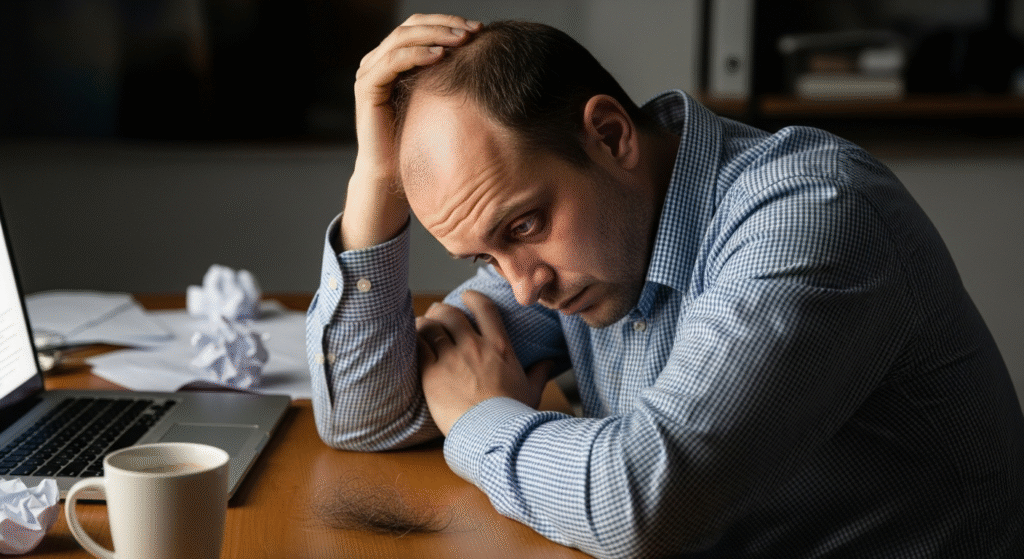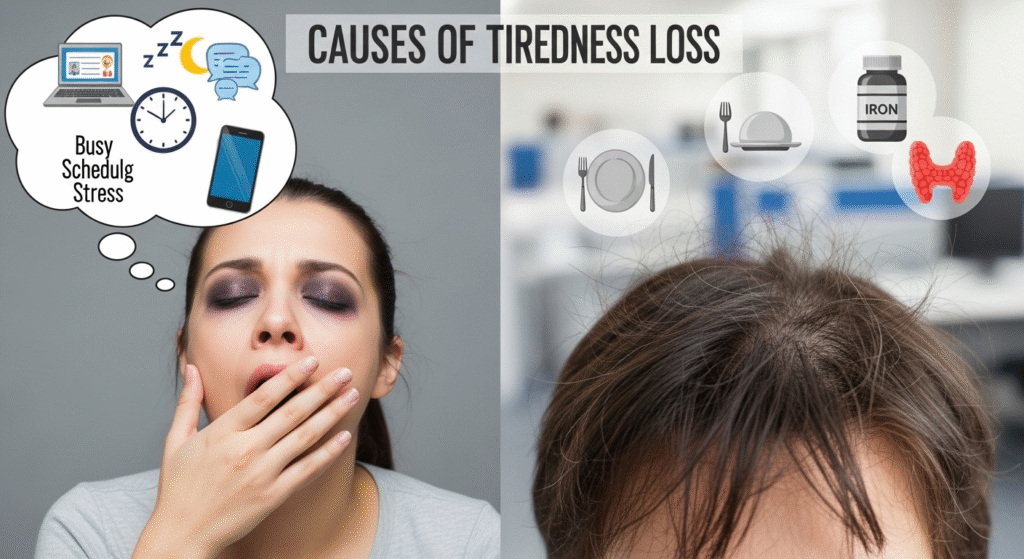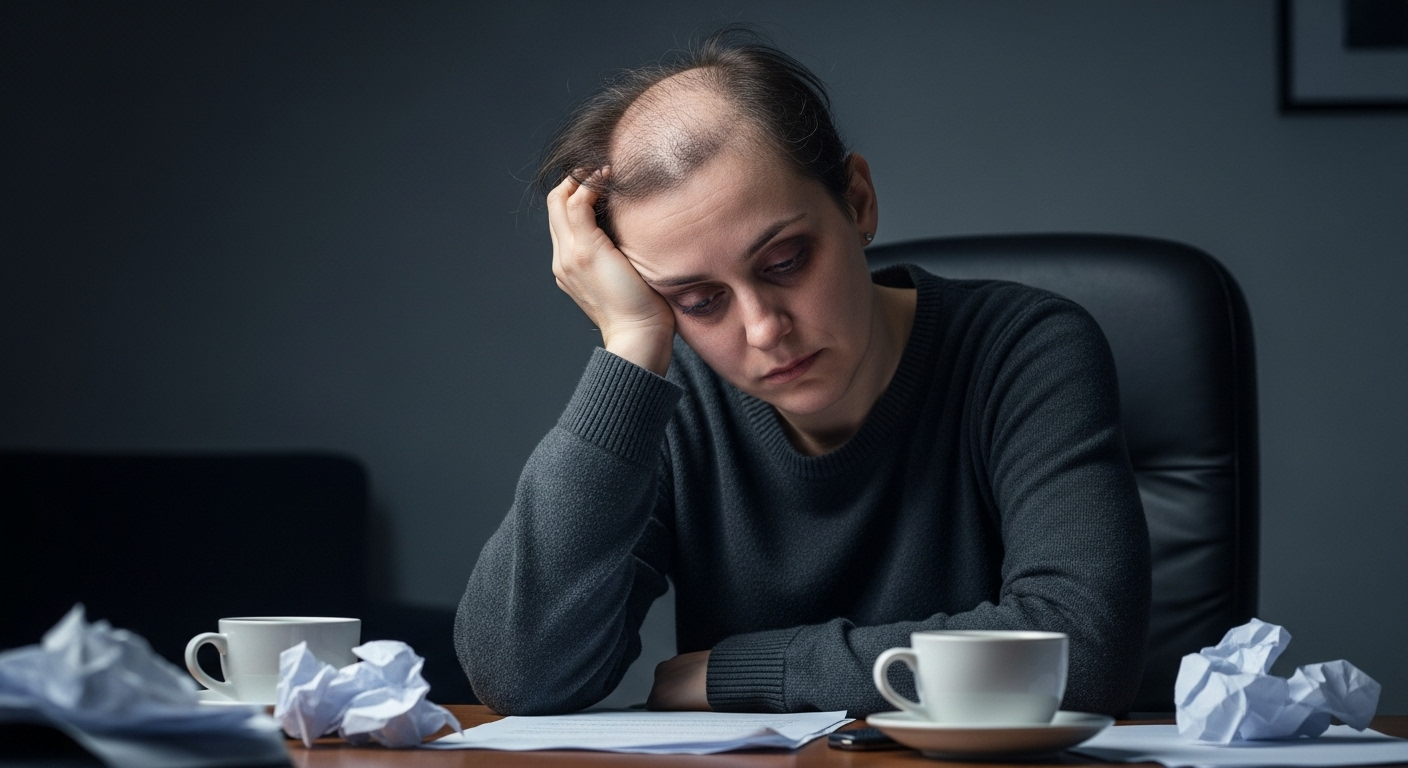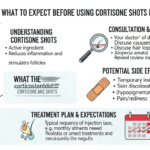If you’re feeling constantly tired and have noticed thinning or shedding hair, you're not alone. Many people face the dual challenge of fatigue and hair loss, often without realizing how closely the two are connected. Tired and hair loss can be linked through stress, poor sleep, and hormonal imbalances, among other factors. In this article, …
If you’re feeling constantly tired and have noticed thinning or shedding hair, you’re not alone. Many people face the dual challenge of fatigue and hair loss, often without realizing how closely the two are connected.
Tired and hair loss can be linked through stress, poor sleep, and hormonal imbalances, among other factors. In this article, we’ll explore the connection between fatigue and hair thinning, and discuss practical solutions to address both issues. By the end, you’ll know how to manage your tiredness and restore your hair health effectively.

How Tiredness Can Lead to Hair Loss
The Link Between Tired and Hair Loss
Fatigue, especially when it’s chronic, can directly impact the health of your hair. When the body is exhausted, it produces higher levels of cortisol, the stress hormone. Elevated cortisol levels can disrupt the natural growth cycle of hair follicles, leading to hair shedding. In some cases, the body’s energy reserves are used for vital functions, leaving less energy for non-essential processes like hair growth.
Hair growth follows a natural cycle of growth, rest, and shedding, and excessive tiredness can force the hair follicles into the shedding phase prematurely, leading to hair loss. This condition, known as telogen effluvium, is one of the most common types of hair loss associated with stress and fatigue.
Hormonal Imbalances Caused by Stress and Exhaustion
When you’re tired, especially due to chronic stress, your hormone levels can become imbalanced. High cortisol can reduce the levels of thyroid hormones, which are essential for healthy hair growth.
Thyroid dysfunction is a common cause of hair thinning, and fatigue can exacerbate this condition. Additionally, hormonal fluctuations caused by stress can interfere with the hair growth cycle, causing hair follicles to enter the resting phase prematurely.
Physical Impact of Fatigue on the Scalp and Hair Follicles
Chronic tiredness also impacts circulation, leading to reduced blood flow to the scalp. This decreased circulation means that hair follicles receive less oxygen and fewer nutrients, both of which are essential for hair growth. When hair follicles are deprived of these nutrients, it can slow down the growth process and lead to weak, thinning hair.
Common Causes of Tiredness That Contribute to Hair Loss

Stress and Its Impact on Hair Loss
Stress is one of the primary causes of fatigue-related hair loss. When the body is under stress, it produces excess cortisol, which can disrupt the hair cycle. This disruption causes hair to shed faster than usual. Stress can trigger a condition known as telogen effluvium, where hair prematurely enters the shedding phase. In some cases, stress can even trigger alopecia areata, an autoimmune condition that causes hair to fall out in patches.
Poor Sleep and Its Role in Hair Regrowth
Sleep is crucial for hair health. During deep sleep, the body repairs itself and produces growth hormones that aid in cell regeneration, including the cells that promote hair growth.
When sleep is disrupted or insufficient, the production of these growth hormones decreases, which can lead to hair thinning. Additionally, poor sleep exacerbates stress, creating a vicious cycle that negatively impacts both your energy levels and hair health.
Nutritional Deficiencies Caused by Fatigue
Fatigue often leads to poor eating habits, either from lack of time or energy. When you’re tired, you might skip meals or reach for processed foods that lack the vitamins and minerals your hair needs to grow.
Common nutritional deficiencies associated with tiredness include a lack of iron, vitamin D, biotin, and zinc—all of which are essential for hair health. Over time, these deficiencies can contribute to hair thinning and hair loss.
Can Restoring Energy Help Prevent or Reverse Hair Loss?
The Benefits of Better Sleep for Hair Health
Improving your sleep quality can directly benefit your hair health. A proper sleep cycle allows your body to repair damaged cells, boost hair follicle function, and encourage hair growth. Aim for 7-9 hours of quality sleep each night. If you’re struggling with sleep issues, try establishing a consistent bedtime routine, reducing caffeine intake, and eliminating screen time before bed.
Managing Stress and Its Positive Effect on Hair
Reducing stress levels can have a significant impact on both your energy levels and hair health. Techniques like meditation, yoga, deep breathing exercises, and regular exercise can help lower cortisol levels. When you manage your stress, you not only feel more energized but also promote a healthier scalp and hair growth.
Correcting Nutritional Deficiencies to Support Hair Regrowth
If you’ve been feeling tired due to poor diet, replenishing key vitamins and minerals can help both your energy and your hair.
Include iron-rich foods (like spinach, beans, and lean meats), vitamin D (through sunlight and fortified foods), biotin (from eggs, nuts, and seeds), and zinc (found in pumpkin seeds and chickpeas) in your daily diet.
Supplements can also help, but it’s always best to consult with a healthcare provider before starting any new supplement regimen.
How to Address Fatigue-Related Hair Loss: Tips and Treatments
Simple Lifestyle Changes to Improve Energy and Hair Health
Making some simple lifestyle changes can help reduce fatigue and improve your hair health:
- Exercise regularly to boost circulation and reduce stress.
- Stay hydrated to support your body’s natural functions, including hair health.
- Practice good sleep hygiene by creating a restful environment and avoiding stimulants before bedtime.
- Manage your stress levels through relaxation techniques.
Hair Growth Treatments for Tiredness-Related Loss
Several treatments can help reverse hair loss related to fatigue:
- Minoxidil (Rogaine) is a topical treatment that can stimulate hair growth in cases of thinning hair.
- PRP (Platelet-Rich Plasma) therapy involves injecting platelets from your own blood into the scalp to encourage hair regrowth.
- Hair transplants are another option for those with more severe hair loss.
Consult with a Dermatologist or Hair Specialist
If you’re experiencing significant hair loss, it’s important to consult with a dermatologist or hair restoration specialist. They can evaluate your hair loss, identify any underlying causes, and recommend a personalized treatment plan that may include medications, lifestyle changes, or hair restoration procedures.
FAQs
Can tiredness cause permanent hair loss?
No, the hair loss caused by tiredness, stress, and poor sleep is usually temporary. Once these factors are addressed, hair typically regrows.
How long does it take to see hair regrowth after improving sleep and reducing stress?
It can take 3-6 months to see noticeable hair regrowth after addressing the root causes of fatigue-related hair loss.
Are there any supplements that can help with tiredness and hair growth?
Yes, iron, biotin, vitamin D, and zinc are all essential for both energy and hair health. Consider speaking with a healthcare provider to determine the best supplements for your needs.
Take Control of Your Energy and Hair Health Today
If you’re struggling with both tiredness and hair loss, don’t wait to take action. By managing stress, improving sleep, and boosting your nutrition, you can start improving both your energy levels and hair health. Book a consultation with Dr Uzma Irfan, an ISHRS-certified surgeon in Islamabad today specialist to discuss treatment options and take the first step toward healthier hair.






